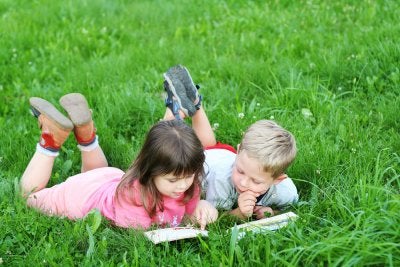-
Helping Your Fifth-Grader Tackle Research Reports
Although it’s common to introduce students to the idea of writing research reports in third or fourth grade, fifth grade is usually the year when students are asked to produce a three-or four-page paper that is well-researched and coherently organized. It’s tough for parents to walk the line between offering homework help and making sure the students do the work themselves. One effective solution is to enroll your child in an after school program near Pembroke Pines. After school activities can include professional homework help.
Research
First, your fifth-grader needs to identify a topic of interest. The teacher may assign a broad topic, such as the Revolutionary War or the Industrial Revolution. Help your child choose one narrow topic from these broad categories, such as famous ride of Paul Revere or the invention of the cotton gin. Take your child to the library and browse books to identify a topic and begin researching it. Then, have him or her do some Internet research using a child-friendly browser. Teach your child how to recognize authoritative websites.
Organization
Encourage your child to organize his or her notes and thoughts during quiet study time in the after school program. At this stage, your child should begin developing an outline. Some kids struggle with this, but it may help for students to think of different sections as categories. For example, categories of information for a paper on poison dart frogs might include what the frogs look like, what they eat, and where they live.

First Draft
The introduction and conclusion are common problem areas for fifth graders. If your child struggles with this, you can have him or her write the body of the paper first, and then go back to do the intro and conclusion. The introduction is an appropriate place to get a little creative. Your child could mention a fun fact about the topic. For example, he or she might start by writing that a single golden poison dart frog is toxic enough to kill 20,000 mice. This can provide a nice transition into a paragraph that discusses how the frogs’ bright colors warn predators of their toxicity.
Final Draft
Students should get into the habit of finishing their papers ahead of time, and setting them aside for a day or two before proofreading and revising. In addition to polishing the draft during after school care, your child can read the paper aloud to you to see how well the sentences and paragraphs flow.
-
Positive Parenting: How to Set and Enforce Limits During the School Year
Creating a solid foundation of expectations for your child can help promote his good behavior and success in school. If your student is preparing to enter first grade in Pembroke Pines this year, then read on for advice on using positive parenting to set and enforce limits that can promote a great school year.

Give Explanations
Setting boundaries is important for teaching your child what is expected of him. However, kids may become argumentative or defensive if you make rules without offering reasons for them. To help avoid this, set limits while using words rooted in positivity and let your first grader know why each limit is needed. For example, instead of instructing your child not to play with his toys when he should be getting ready for school, tell him when he should play with them and why.
Enforce Consequences
When it comes to promoting the behaviors you want to see in your child, following up with appropriate consequences for both good and unwanted actions is key. Otherwise, if positive behavior is overlooked or disruptive behavior is ignored, then your first grader may find it difficult to understand what it is that you want him to do. For example, simply thanking or praising your child when he does what you have taught him to without being told each time is an excellent way to reinforce good behaviors. In situations when your child ignores instructions or behaves disruptively, you can, for example, institute quiet time, remove toys, or take away privileges as consequences.
Work Together
Setting rules and deciding how you will enforce them doesn’t have to be a one-sided task. By discussing and making boundaries and consequences with your first grader, you can help him gain a better understanding of why certain behaviors are appropriate or not. Frame conversations like these in a positive light by avoiding negative words. Additionally, consider putting limits in writing with your child’s help, and then posting them in your home as a reminder for both of you.
-
Packing Snacks for Your Summer Camper
Summer camp is practically a rite of passage for kids. In Pembroke Pines, summer day camps feature lots of fun activities and opportunities for kids to make new friends. Unfortunately, it can be difficult for parents to get children to eat healthy foods while at summer camp. The trick is to make healthy snacks look fun to eat. You can see some demonstrations of this when you watch this interview with a registered dietitian.
She explains what she looks for in a healthy snack—primarily a combination of lean proteins and complex carbohydrates to give your child the energy needed for summer camp activities. For instance, you can add a little mustard to some low-sodium turkey slices, and wrap them around a thin, whole grain breadstick. Pack pepper strips and carrot sticks to dip into some low-sugar, plain or vanilla Greek yogurt. You could also stuff some granny smith apples, cinnamon, and low-fat ricotta cheese into a whole grain pita pocket.
-
Tips for Kindergarten Parents
Even if your child has attended structured early childhood education programs, the kindergarten year is an exciting milestone, as it’s considered the first year of formal schooling. Your child’s education in Pembroke Pines encompasses important academic skills like math and literacy, but it also involves personal growth and socio-emotional development. Encourage your child to reach for the stars, but have reasonable expectations and give your son or daughter the freedom to simply enjoy childhood.

Nurture your child’s independence.
When your son or daughter reaches kindergarten age, he or she will start displaying greater independence. Encourage this by teaching important self-care skills. Teach your child how to button up clothes, tie shoes, and wash hands. Position the milk jug and snacks on a lower shelf in the fridge, and let your child serve him-or herself. Spills are to be expected, as your child is still learning self-care skills.
Read every day.
Reading with your child every day is one of the most impactful ways to support your child’s education. It lets your son or daughter naturally absorb the rhythm and structure of sentences, and simply get absorbed in the magical world of stories. Reading with your child nurtures the close bond you share with him or her. It sparks your child’s imagination and entices his or her curiosity.
Create a musical home.
Every child has artistic tendencies, and nurturing them supports your child’s self-esteem and sense of wonder. Music also encourages a strong vocabulary, better memory, and dynamic social skills. Sing with your child in the car, or start a band in the kitchen by tapping on overturned pots and drinking glasses. Talent is not important, but enthusiasm is.
Talk often.
When your child was an infant, you probably learned that talking to him or her frequently supported healthy development. During the kindergarten age, this fact still holds true. Encourage your child’s oral language skills by actively listening to him or her, asking open-ended questions, and letting your child know that what he or she says is important to you.
-
Helping Your First Grader with Reading Skills
First grade is a pivotal year for literacy. Although struggling readers can always catch up, first graders generally establish themselves as competent or struggling readers during this year. You can support your child’s reading fluency and language comprehension by enrolling him or her in a high-quality first grade program in Pembroke Pines, but kids also need plenty of support at home. Talk to your child’s teacher about what you can do to support his or her success.

Writing Practice
First graders need lots of repetition and practice to get the hang of reading and writing fluently. Encourage your child put his or her new writing skills to use by asking for help with everyday tasks, like writing reminders on the calendar or adding items to the shopping list. Give your child a visually appealing journal to write in, and help him or her write short letters to grandparents or pen pals.
Word Games
Games are always an engaging way to entice kids to practice their literacy skills. Try Bananagrams, which involves word tiles contained within a “banana” pouch. Ask your child to write a story with you by taking turns adding one sentence to it. Start with a prompt, such as, “Jane was so excited when she woke up this morning because…” You could even create “mailboxes” for each family member. Fold a piece of construction paper in half, and staple the sides together to create a pocket that can be taped to a bedroom door. Household members can write silly notes to each other and “mail” them.
Critical Thinking Questions
Set aside some time each day to read with your child. Take turns reading from a favorite book and ask questions about the story that encourage critical thinking skills. Ask questions such as, “What do you think Jose will do next?” and “How do you think Gretchen felt when her friends did that?”
Screen Time
There are certainly some genuinely educational TV programs and computer games, but these are no substitute for a tangible book. Get your child off on the right foot by limiting screen time. Take your child to the library regularly for new materials he or she can explore during free play time. It never hurts to grab your own book to read silently as your child explores a new picture book or easy reader book.
-
Top Reasons Why Summer Day Camp Benefits Children
When summertime comes around, families are often faced with a dilemma about how to keep their little ones busy. Whether you work during the day or simply want your child to do something other than sit inside glued to an electronic device, day camp can be the best solution. In fact, summer day camps in Pembroke Pines offer a surprising array of benefits for kids. Here is a look at some of the rewards your child can reap by signing up for summer camp.

Summer day camp helps kids build social skills.
Summer day camp provides a unique social situation for kids. Often, going to day camp means meeting and bonding with other children that aren’t in their usual class. That means that they have to go out of their way to make and foster connections, learning the negative outcomes of choosing the wrong group of friends or ostracizing other campers. As day campers are making friends, they also must navigate the camp environment on their own and figure out how to get their needs met without being surrounded by familiar faces.
Summer day camp prevents brain drain.
If the last day of school is the first day your child starts forgetting everything he or she learns, the summer day camp could be the solution you’re looking for. Day camp doesn’t resemble school, but mixed in with all of the fun are lessons to help keep your child’s brain engaged and skills up. Your child won’t know that he or she is really learning, but you’ll see the benefits when the new school year begins.
Summer day camp keeps kids active.
If you’re constantly trying to push your child to get outside and play, let summer day camp help you make sure your child gets all that important activity into his or her day. You can count on fun outdoor activities being a central part of camp, which will help your child stay physically healthy and strong while encouraging good habits that can last a lifetime.
-
Activities for Strengthening Your Child’s Motor Skills
A central part of early childhood education is fine and gross motor skill development. At your child’s early learning center in Pembroke Pines , practice with motor skills is likely to be incorporated into the lessons each day. You can further support these activities by working on motor skill development at home.
Watch this video for some advice for improving your child’s motor skills. You don’t need to invest in a special equipment to practice motor skills. Help your child practice balance by using a 2×4 as a balance beam and work on finger and hand skills with Play-Doh that you either buy or make together. Continue making the challenges harder as your child masters different tasks, so that his or her skills continue to develop.
-
Getting Kids Ready for Summer Day Camp: Tips for Parents
School will be out soon, and summer camp will begin shortly after. This can be an exciting time for your child, because he can stay busy during the summer and engage in fun summer camp activities like field trips and sports. Whether your child has been to a summer camp near Pembroke Pines or not, there are certain tips that can help prepare your child for his upcoming summer. Read on for helpful tips to get your child ready for summer camp.

Tip #1: Involve Your Child
It is important to involve your child in the decision of summer camp. If your child is excited about the different activities, then he is more likely to enjoy his time away from home. Research different summer day camps and speak with each program’s administrator. Find out what types of summer activities are planned for the kids, and ask your child what he would prefer. Also, consider the potential field trips that each day camp offers to provide further incentive for your child to attend. This will make the summer much more enjoyable for everyone.
Tip #2: Pack Summer Essentials
There are certain summer essentials that you and your child should always have when you leave the house. Ensure that your child has a tube or bottle of sunblock in his backpack to reapply, and apply it before leaving the house in the morning. Pack a refillable water bottle and a light lunch or snack to keep your child hydrated and full of energy. Encourage your child to wear a hat for additional sun coverage while playing outside. This can prevent sunburns and heat exhaustion.
Tip #3: Meet the Instructors
Once you and your child have picked a summer camp, make an appointment to meet with the instructors or a lead administrator. This meeting is a great opportunity to learn more about the leaders your child will be with all summer, and it helps your child feel more comfortable attending the upcoming program.
-
The Importance of Communication-Rich Environments
Are you searching for the right preschool in Pembroke Pines and wondering what to look for in a quality program? If so, then you could benefit from learning about the importance of communication-rich environments for child development.
Providing children with a variety of experiences can be critical for the growth of their language and communication skills. For this reason, you should look for a preschool program that will help promote your child’s development by providing him with an environment that is language and communication-rich.
Your child’s preschool program should offer multiple language models over the course of the day, use developmentally appropriate language, model appropriate forms of grammar, and include daily drawing and writing activities. Additionally, your child’s preschool instructor should respond to every communication attempt made by children in the classroom, encourage families to visit the classroom, frequently read to the children, and respond to children based on their focus and intent. Selecting a program with these qualities can help promote the development of your preschooler.

-
Choosing Educational Toys for Pre-K Kids
Toys can be a fun distraction for children, but they can also be educational and support their development. Is your child currently in pre-kindergarten in Pembroke Pines ? If so, then she is probably experimenting with her developing physical skills, asking many questions, and displaying a longer attention span. Continue reading for tips on selecting educational toys that can support your child’s education at this age.

Pick Toys That Allow Her to Create
Encouraging your child’s creativity is an excellent way to help her learn and develop. For this reason, you should look for toys that give your child something to create with. Some great examples of creative materials to offer your pre-k student are colored construction paper, crayons, markers, paintbrushes, finger paint, scissors made for children, scraps of cloth, paste, playdough, and chalk.
Choose Toys That Encourage Problem-Solving
At this age, you can support your child’s education and development by providing her with toys that demand problem-solving skills. Puzzles with 12 or more pieces and collections of objects that can be sorted in various ways, such as by color, size, quantity, and shape, are great educational toys for children in pre-k. You might offer her colored blocks, different sized bowls, and everyday items from around the house for these activities.
Select Picture Books That Are More Advanced
Now is the time to make the step up from the picture books that your child loved as a preschooler. As you peruse your options, choose books for your pre-k kid that have fewer pictures and more words than she is accustomed to.
Opt for Toys That Help Your Child Play Pretend
At this stage in her development, you can help your child by providing her with toys that encourage and help her to play pretend and stimulate her imagination. Consider giving your kid child-sized furniture, play food and appliances, dolls or stuffed animals to accessorize, dress-up clothes, puppets, construction sets, and blocks for building structures.
RECENT POSTS
categories
- Uncategorized
- Early Learning Center
- Pre-K
- Children
- Child Care Center
- Preschooler
- Preschool Blog Category | Tanglewood Academy
- Preschool Lunch
- Tanglewood Academy
- After-School Program
- Toddler School
- Early Childhood Education
- preschool activities
- pre-kindergarten
- childhood education
- pre-kindergarten programs
- Children’s education
- enrichment opportunities
- Kindergarten
- Nurturing Education Environment
- Toddler Care
- Child Separation Anxiety
- Toddlers
- Summer camp
- summer activities
- VPK
- Voluntary Pre-K
- Outdoor Activities
- Smart Strategies
- Tie Shoes
- Snacks
- Physical Activities
- Education
- Enrichment Activities for Kids
- Early Education Activities
- Preschool Curriculum
- Classroom Learning
- APPLE accreditation
- Language Comprehension
